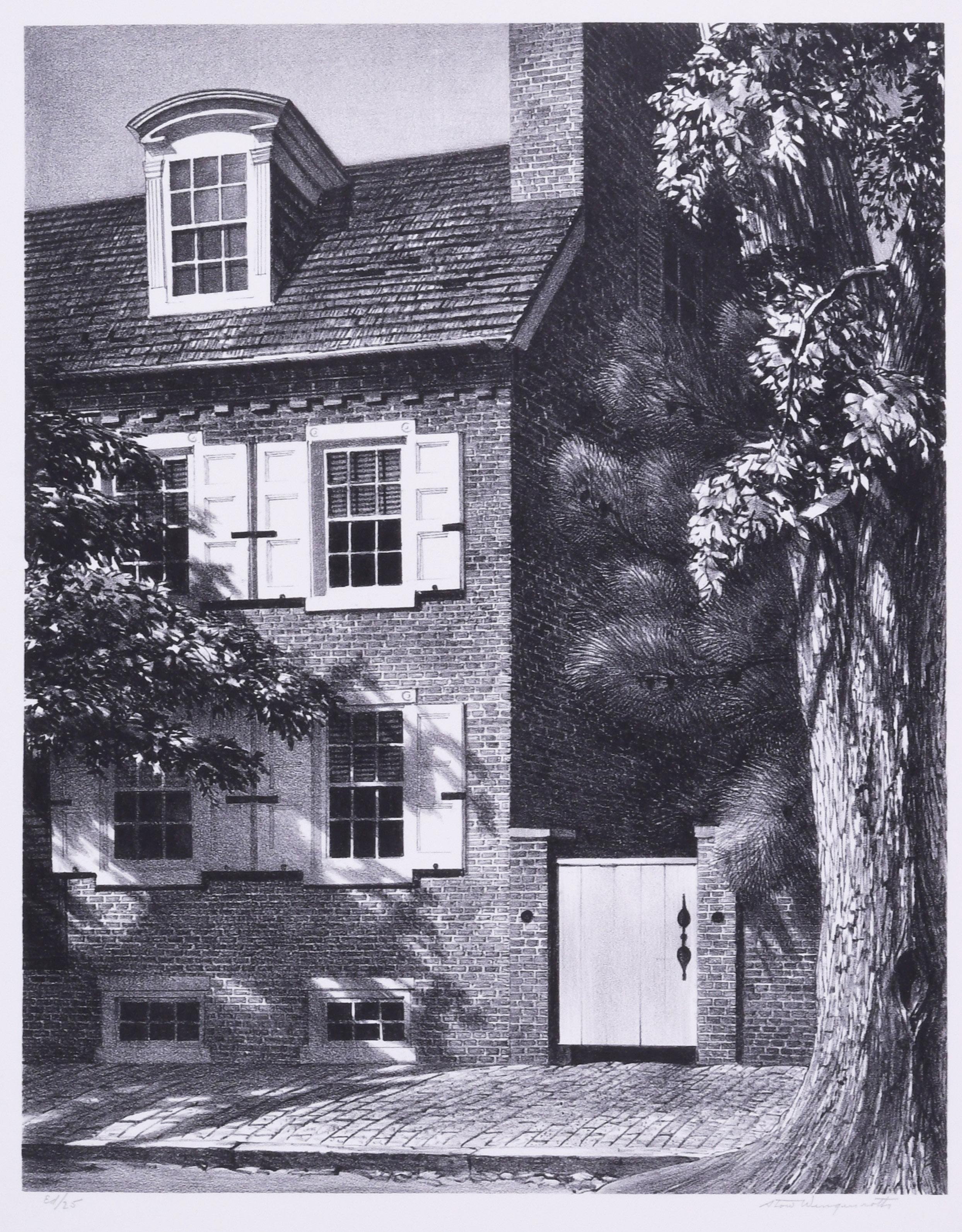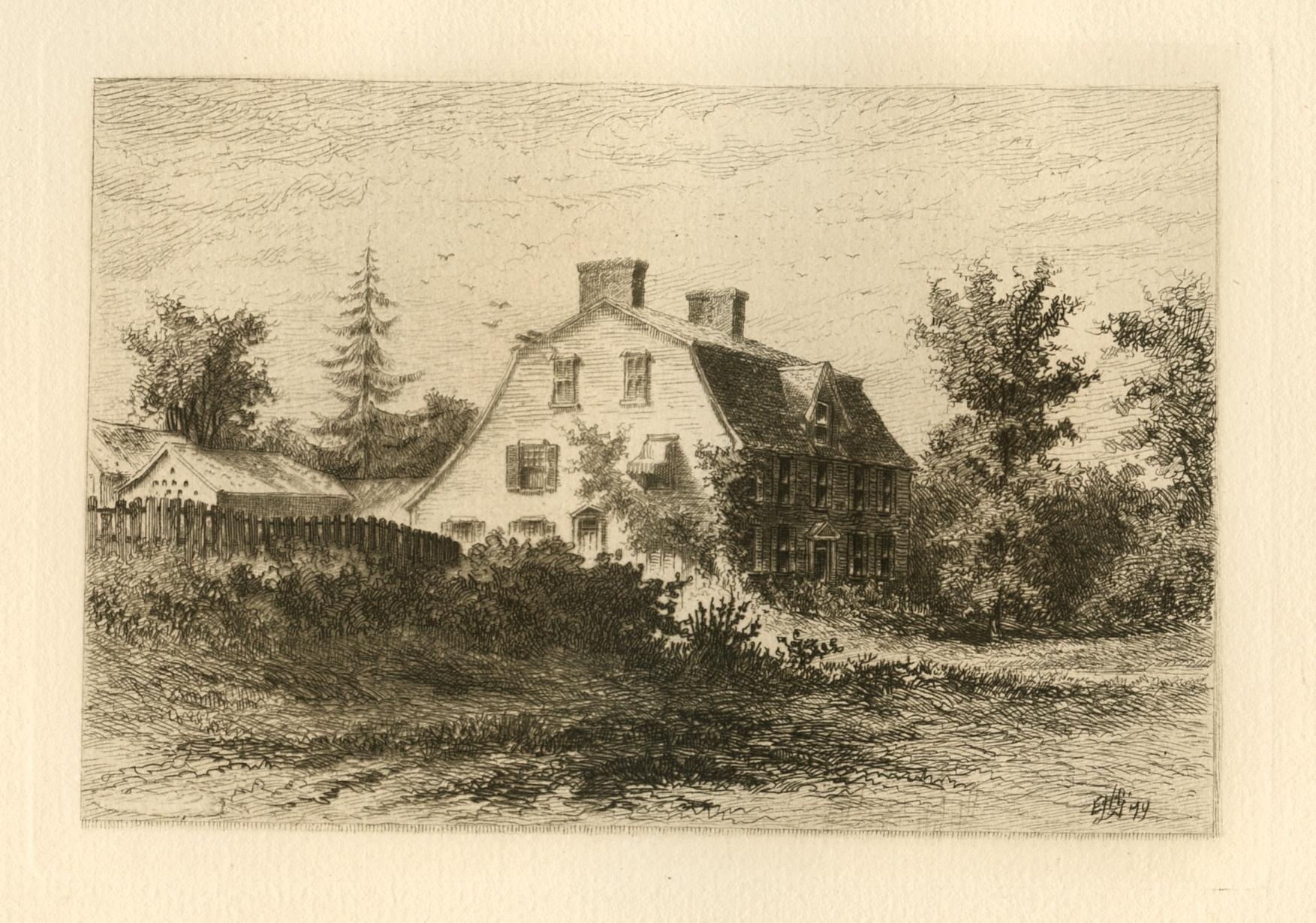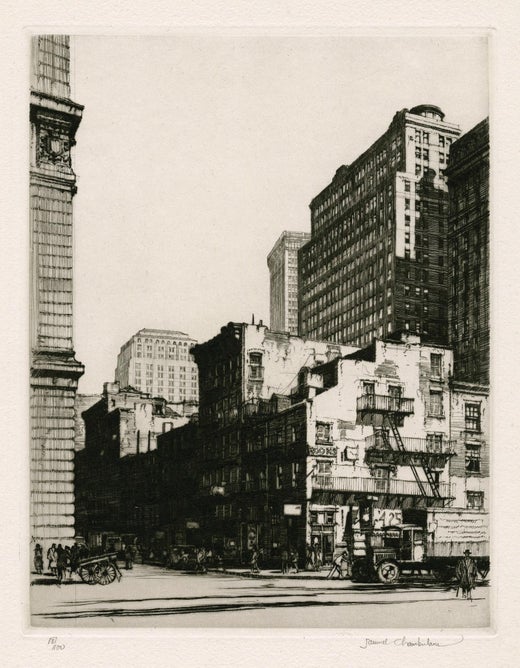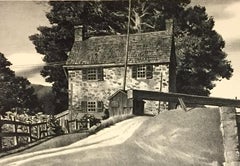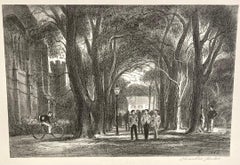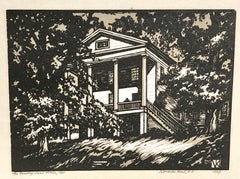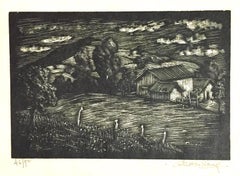Items Similar to Samuel Chamberlain, The Public Gaol, Williamsburg (Virginia)
Want more images or videos?
Request additional images or videos from the seller
1 of 5
Samuel ChamberlainSamuel Chamberlain, The Public Gaol, Williamsburg (Virginia)1938
1938
$750
£557.87
€653.16
CA$1,046.50
A$1,171.07
CHF 611.48
MX$14,397.06
NOK 7,714.48
SEK 7,259.29
DKK 4,873.07
Shipping
Retrieving quote...The 1stDibs Promise:
Authenticity Guarantee,
Money-Back Guarantee,
24-Hour Cancellation
About the Item
Samuel Chamberlain was a superb draftsman and his architectural images are often very complex. This image is, by contrast, quiet and understated: serene to the point of lonely. It's a view of the 'Gaol' in Virginia's Colonial Williamsburg. More than a mere jail, a gaol was also a workhouse and/or debtor's prison -- a sad and horrific place. It was common for residents to die from the cold or contagious diseases.
Signed and numbered in pencil. Titled in lower margin possibly in another hand. Reference notations on the reverse, also in another hand. Edition of 100 (probably proposed -- this isn't a common print).
Here we've given the 'style' as American Modern. Probably second or third-generation Etching Revival is closer.
- Creator:Samuel Chamberlain (1895-1975, American)
- Creation Year:1938
- Dimensions:Height: 8 in (20.32 cm)Width: 11 in (27.94 cm)
- Medium:
- Movement & Style:
- Period:
- Condition:Extremely good condition.
- Gallery Location:New York, NY
- Reference Number:1stDibs: LU141028401222
Samuel Chamberlain
Samuel V. Chamberlain, printmaker, photographer, author, lecturer, and teacher was born in Cresco, Iowa on October 28, 1895. His family moved to Aberdeen, Washington in 1901 and, in 1913, Chamberlain enrolled in the University of Washington in Seattle where he studied architecture under Carl Gould. By 1915, he was enrolled in the School of Architecture of the Massachusetts Institute of Technology in Boston. With the United States' involvement in the First World War, Chamberlain sailed to France where he volunteered in the American Field Service. In 1918, he was transferred to the United States Army to complete his tour of duty. After the war, he returned to Boston and resumed his architectural studies, which he eventually discontinued and tried for a few years to work as a commercial artist. Chamberlain received the American Field Service Scholarship in 1923, which he used to travel in Spain, North Africa, and Italy. In 1924 he was living in Paris and in the spring he studied lithography with Gaston Dorfinant and in the autumn and winter months, he studied etching and drypoint with Edouard Léon. He published his first etching the following year. In 1927, he studied drypoint with Malcolm Osborne at the Royal College of Art in London. He taught part-time at the School of Architecture, University of Michigan, Ann Arbor; and the School of Architecture, Massachusetts Institute of Technology between his travels abroad. Chamberlain eventually settled for a dozen years in France. He authored and sometimes co-authored, with his wife Narcissa, Domestic Architecture of Rural France, Clementine in the Kitchen, New England Rooms 1639-1863, and Charleston Interiors. Chamberlain was a member of the American Academy of Arts and Sciences, the American Institute of Architects, the American Society of the French Legion of Honor, the Boston Camera Club, the Boston Printmakers, the Chicago Society of Etchers, Photographic Society of America, the Print Club of Albany, the Society of American Etchers, and was elected an Academician in the National Academy of Design. His work is represented in the collections of the Smithsonian American Art Museum, the Library of Congress, the Metropolitan Museum of Art, the Philadelphia Museum of Art, the National Academy Museum, the Harvard Art Museums, the Carnegie Museum of Art, the Museum of Fine Arts in Houston, the Museum of Fine Arts Boston, and the Nelson-Atkins Museum of Art. Samuel V. Chamberlain died in Marblehead, Massachusetts on January 10, 1975.
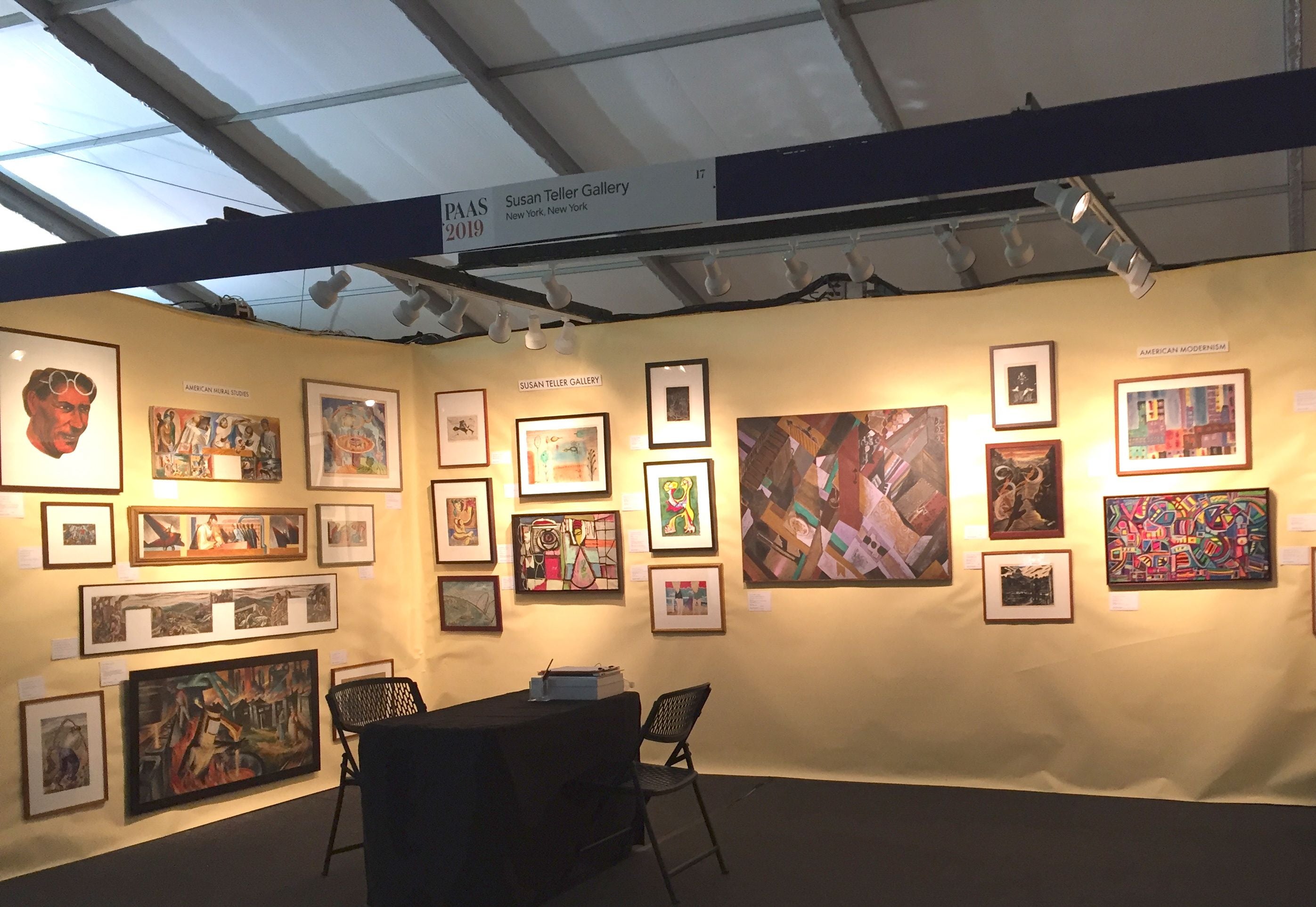
About the Seller
4.9
Platinum Seller
Premium sellers with a 4.7+ rating and 24-hour response times
Established in 1988
1stDibs seller since 2020
122 sales on 1stDibs
Typical response time: 1 hour
- ShippingRetrieving quote...Shipping from: New York, NY
- Return Policy
Authenticity Guarantee
In the unlikely event there’s an issue with an item’s authenticity, contact us within 1 year for a full refund. DetailsMoney-Back Guarantee
If your item is not as described, is damaged in transit, or does not arrive, contact us within 7 days for a full refund. Details24-Hour Cancellation
You have a 24-hour grace period in which to reconsider your purchase, with no questions asked.Vetted Professional Sellers
Our world-class sellers must adhere to strict standards for service and quality, maintaining the integrity of our listings.Price-Match Guarantee
If you find that a seller listed the same item for a lower price elsewhere, we’ll match it.Trusted Global Delivery
Our best-in-class carrier network provides specialized shipping options worldwide, including custom delivery.More From This Seller
View AllStow Wengenroth, Lock House, Lambertville, New Jersey
By Stow Wengenroth
Located in New York, NY
Signed, numbered, and with extensive dedication to the artist Norman Kent. Titled in lower margin in another hand. Really, no one could draw on a lithograp...
Category
Mid-20th Century Naturalistic Landscape Prints
Materials
Lithograph
Charles Locke, McCosh Walk, Princeton University
By Charles Locke
Located in New York, NY
This lithograph is signed in pencil under the image at the lower right. Just above that, in the image, are the artist's initials and the date, 1942.
This well-known walkway on the P...
Category
1940s American Modern Landscape Prints
Materials
Lithograph
Norman Kent, The Bentley-Kent House, 1831
Located in New York, NY
Signed titled, and dated, in pencil, and annotated in lower margin "My great-great grandfather's house, built in Bentleyville, Ohio in 1831; torn down in 1956."
The wood engraving i...
Category
1960s American Modern Landscape Prints
Materials
Lithograph
Hendrik Glintenkamp, (Farmyard)
By Hendrik Glintenkamp
Located in New York, NY
More a wood engraving rather than a woodcut, Glintenkamp's Farmyard scene was given all the care and detail of the artist's more complex images. It is signed and numbered in pencil. ...
Category
1920s American Modern Landscape Prints
Materials
Woodcut
Donald Shaw MacLaughlan, A Tuscan Farm
By Donald Shaw MacLaughlan
Located in New York, NY
Donald Shaw MacLaughlan's small, even 'miniaturist' etching, 'A Tuscan Farm,' features an idyllic view of a scene he would have encountered on his European...
Category
Early 1900s American Modern Landscape Prints
Materials
Etching
Kevin B. O'Callahan, (Street Scene) (Buffalo, NY?)
By Kevin B. O'Callahan
Located in New York, NY
This (Street Scene) is undoubtedly O'Callahan's hometown of Buffalo, NY, where he lived and spent most of his career. The artist's name appears in pencil at the bottom edge on the re...
Category
1930s Aesthetic Movement Landscape Prints
Materials
Intaglio
You May Also Like
The Governor Palace, Williamsburg Serie
By Samuel Chamberlain
Located in San Francisco, CA
This artwork titled "The Governor Palace, Williamsburg Series" 1940 is an original etching on paper by noted American artist Samuel V. Chamberlain, 1895-1...
Category
Mid-20th Century Realist Figurative Prints
Materials
Etching
The Capitol, The Williamsburg Series
By Samuel Chamberlain
Located in San Francisco, CA
This artwork titled "The Capitol, Williamsburg Series" 1940 is an original etching on paper by noted American artist Samuel V. Chamberlain, 1895-1975 It is...
Category
Mid-20th Century Realist Figurative Prints
Materials
Etching
Williamsburg
By Josef Eidenberger
Located in San Francisco, CA
This artwork titled "Williamsburg" c.1974 is a color etching on Wove paper by noted Austrian artist Josef Eidenberger, 1899-1991. It is hand signed in pencil by the artist. Publishe...
Category
Mid-20th Century Realist Figurative Prints
Materials
Etching
Raleigh Tavern, Williamsburg, VA
Located in San Francisco, CA
This artwork titled "Raleigh Tavern, Williamsburg, VA" c. 1970 Is an original etching on paper by noted American artist Leonard H. Mersky, 1917-1994. It is signed, titled and numbered 13/300 in pencil by the artist. The size of the plate mark (image) is 7 x 8 inches, framed size is 15.15 x 16.15 inches. The artwork is in excellent condition, the frame is in good condition, it has minor dents.
About the artist.
Born in Boston in 1917, Leonard Mersky...
Category
Late 20th Century Realist Landscape Prints
Materials
Etching
The White Gate (New Castle, Delaware)
By Stow Wengenroth
Located in Fairlawn, OH
The White Gate (New Castle, Delaware)
Lithograph, 1961
Signed in pencil lower right (see photo)
Numbered and title in the lower left (see photos)
Condition: Excellent
Image size: 15 ...
Category
1960s American Realist Landscape Prints
Materials
Lithograph
"Home of Nathaniel Hawthorne" original etching
By Edmund Henry Garrett
Located in Henderson, NV
Medium: original etching. This impression was published in Boston in 1887 by Estes and Lauriat for the "Nature and Art" portfolio and is printed on cream laid paper. Size: 4 3/4 x 6 ...
Category
1880s Prints and Multiples
Materials
Etching
